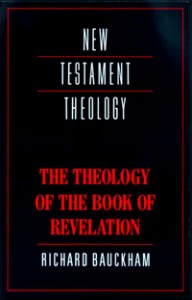The Theology of the Book of Revelation by Richard Bauckham
 There are many different interpretive models for the book of Revelation. Some approach it as though it were a code to be deciphered, matching ancient images with present figures in an attempt to unlock the secrets of the last days. Others see it as a uniquely Christian history with little or nothing to say to believers today. As we seek to understand this fascinating and oftentimes befuddling book, perhaps we should interpret it in basically the same way we interpret every other book of the Bible. That is to say, maybe the key to unlocking Revelation’s secrets is to simply ask, “What did this mean to the people to whom it was originally written?”
There are many different interpretive models for the book of Revelation. Some approach it as though it were a code to be deciphered, matching ancient images with present figures in an attempt to unlock the secrets of the last days. Others see it as a uniquely Christian history with little or nothing to say to believers today. As we seek to understand this fascinating and oftentimes befuddling book, perhaps we should interpret it in basically the same way we interpret every other book of the Bible. That is to say, maybe the key to unlocking Revelation’s secrets is to simply ask, “What did this mean to the people to whom it was originally written?”
In his book The Theology of the Book of Revelation, Richard Bauckham takes this basic exegetical approach, and manages to make sense of, and draw compelling meaning from, John’s Apocalypse. Bauckham starts where most Christian exegetes start with any other biblical book by asking, “What sort of book is this?” The answer, he discerns, is that “Revelation seems to be an apocalyptic prophecy in the form of a circular letter to seven churches in the Roman province of Asia.” (2)
Checking in at less than 170 pages, this book is too dense to properly summarize. Bauckham wastes no words in his exploration of the Apocalypse, efficiently covering the major themes and imagery of the book from beginning to end. If I had to identify a thesis, it would be this: “While rejecting the apocalyptic militancy that called for literal holy war against Rome, John’s message is not, ‘Do not resis!’ It is, ‘Resist! – but by witness and martyrdom, not by violence.’ …Christians conquer the beast by their faithful witness to the truth of God up to and including death for maintaining this witness. In this way their faithful witness to the point of death participates in the power of the victory Christ won by his faithful witness to the point of death: they conquer ‘by the blood of the lamb.’ …The promises to the conquerors at the end of each of the seven messages to the churches present conquering as the only way for Christians to reach their eschatological destiny. …There are clearly only two options: to conquer and inherit the eschatological promises, or to suffer the second death in the lake of fire.” (92)
“The message of the book is that if Christians are faithful to their calling to bear witness to the truth against the claims of the beast, they will provoke a conflict with the beast so critical as to be a struggle to the death.” (93)
We conquer, not through weapons of war, but through testifying to the truth of God in Jesus Christ, thereby instigating a conflict with the beast, whose empire is founded and perpetuated on deception. We bear this witness even to death, thereby participating in Christ’s death, which was his victory. We conquer the beast by becoming faithful martyrs at the hands of the beast. In his bloodthirst, the beast kills God’s people, achieving for himself an apparent victory. But from heaven’s perspective, the beast’s victory is, in fact, his defeat. Just as the crucifixion was the victory of Jesus – not the victory over Jesus – so our martyrdom is our victory in Jesus. Therefore, it is impossible to defeat the people of God through violence. But as John astutely points out throughout Revelation, the only way to defeat God’s people is to seduce them into participation with the beast.
Whatever you believe about the end times, including the millenium, the rapture, or the identity of the rich imagery of Revelation, I think we can all agree with Bauckham’s central point. We combat the beast not with the weapons of the beast nor by the means of the beast, but by the blood of the lamb and the word of our testimony. We must hold onto the truth of Jesus Christ in the midst of the swirling winds of the beast’s deception. We must not be seduced into cooperation with the beast and his empire, but must always faithfully bear witness to the victory of the lamb who was slain.

